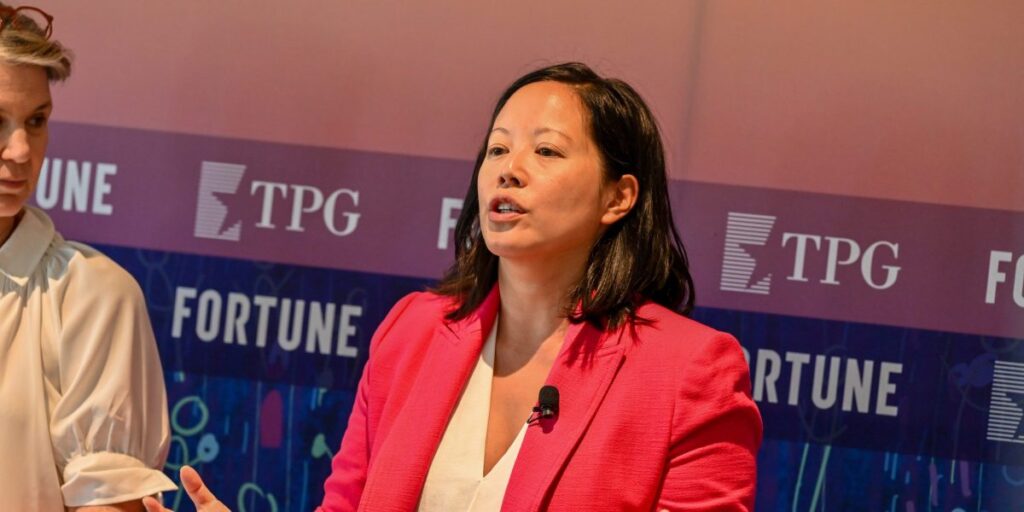Poshmark cofounder says traditional fundraising ‘sucked’: Here’s how she got investors on board
Tracy Sun said investors didn’t connect to the company mission, so she showed them the impact on women.


Poshmark has become a mainstay of the online-shopping world. It’s not only a marketplace to buy used clothes and accessories, but also a platform for users to sell handmade goods and generate their own income. Tracy Sun, cofounder of the e-commerce platform, said nearly one in three American women uses the website today. But the company had to think outside the box to get this far.
When Poshmark was first rallying investors, Sun said she realized traditional fundraising routes weren’t going to cut it; lenders weren’t connecting to the vision of her business, and it was difficult to break past stigmas associated with women-owned companies. At the Fortune Most Powerful Women Summit on Monday, Sun spoke about Poshmark’s trial and errors in fundraising, and how she pivoted.
“We had to do things a bit differently,” Sun said. “The typical pitch was not enough.”
For many women in private equity, reshaping a common approach into a brand new tactic is often the way to get something accomplished.
Caro Investors founder Careina Williams discovered after decades of creating value at real estate private equity firms that she wanted to be an an entrepreneur in the field. But Williams had to contend with the incredibly high barrier to entry for asset owners. She cited one data point that reflects the lack of diversity in private equity: only about 1.5% of $80 trillion is managed by women and people of color.
“The universe is that small,” said Williams. “That doesn’t mean we’re not equipped to be investors.”
And in a field like real estate, for instance, the competitive hurdle is perceived as being even higher, given that many enter the sector via generational wealth, she said. That was out of reach for Williams as the daughter of a Washington, D.C., public school teacher and government worker. Yet, becoming a founder was a critical driver for Williams so that others could visualize what was possible, she explained.
“I know I’m capable at this point, but I want people to see that it’s possible,” she explained.
In 2024, Williams formed a strategic partnership with $224 billion global private equity and alternative investment firm TPG. The firm provided what Williams described as a “significant amount of working capital” needed to own an asset management firm, particularly given that she’s beholden to the same regulatory and other requirements as substantially larger financial firms.
“I wouldn’t be sitting here; I wouldn’t have the firm if it wasn’t for my strategic partnership with TPG,” said Williams.
The partnership accomplished three critical issues, she said. It provided working capital for her firm and provided a multi-fund commitment that validated her track record and returns for pension funds and other large institutional investors. Finally, and most important, the TPG partnership gave Williams access to hundreds of people, various departments, and overall resources and institutional knowledge and experience.
“You would have thought the capital would have been the most important piece but the most invaluable part of the partnership is just their knowhow after years of being able to standup a successful business,” she said. TPG “is helping me punch above my weight as a small firm.”
Indeed, TPG also invested in Poshmark in 2017 as it pursued funding.
According to Poshmark’s Sun, initially raised “a lot” of private capital for Poshmark, then decided to take the company public in January 2021 with an initial valuation of more than $3 billion. But that phase didn’t last long once Sun realized she couldn’t grow the company the way she wanted to while being public. Just a year and a half later, in October 2022, Poshmark was acquired by South Korean internet company Naver Corporation for $1.2 billion and went private. She said navigating these different money-raising efforts was tough—especially as a woman business owner.
She described going through “lots of different financial structures,” and said that “every single one kind of sucked, especially when you’re trying to sell a company based on a mostly female experience.”
Most of the investors she tried to lock down didn’t look like Sun. They were primarily white men, looking to throw cash at a type of project and leadership they were more accustomed to working with. When she would try to level with them on the business promise of Poshmark, they would often defer to other women in their lives, thinking the online-shopping industry is outside of their purview.
“Most of the people you’re talking to have no idea what you’re talking about. Zero idea,” Sun said. “Then they would go and say, ‘Let me talk to my wife about this,’ and she might not even know. That’s a challenge, when the people making the decisions don’t really understand the pain point that you’re solving.”
So Sun got creative, and revamped the way she approached fundraising. She recognized that if they could get investors to meet customers where they are, then maybe they could connect to the vision of Poshmark. They would throw community events called “Posh parties,” traveling to new cities and bringing dozens of workers and customers together. At these events, people would meet one another and strategize selling on the platform. “Magic” happens at those events, Sun said—like 100 best friends who have never met coming together. Investors joined in, and experienced the power of the company.
“Whenever we go we’ll say, ‘Hey potential investor, come here. Come just witness the lights that are on these customers’ faces,’” Sun said. “And when we get them to that event they’re like, ‘Okay, we don’t understand it, but there’s something going on there.’ And that’s usually how we’ve convinced people we have something special.”
Most Powerful Women Daily: Every weekday, MPW Daily provides original reporting, key insights, and expert perspectives on the women leading the moment in business and beyond.





